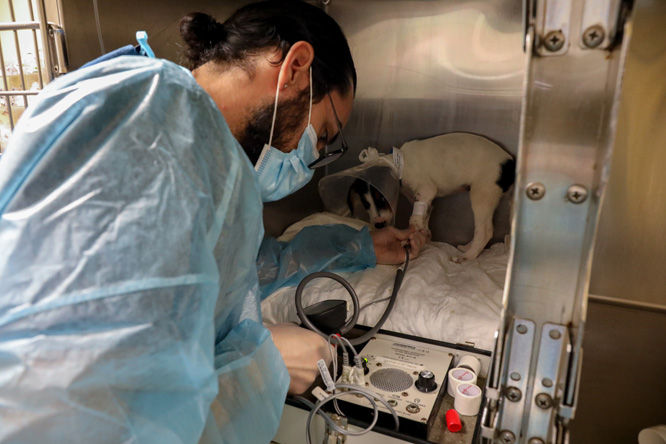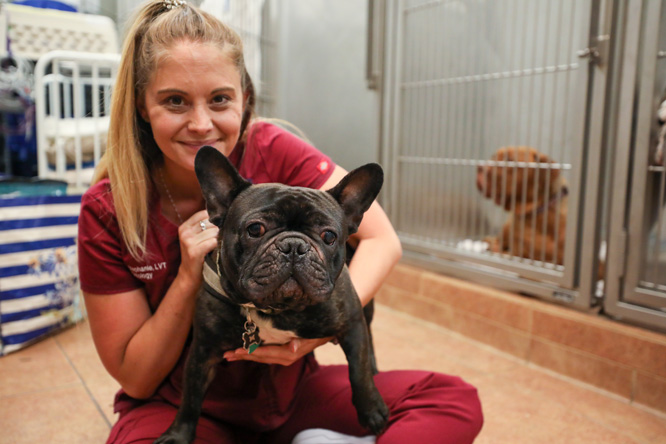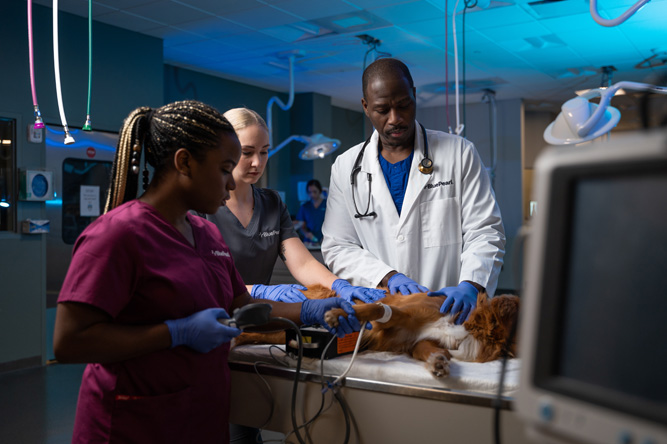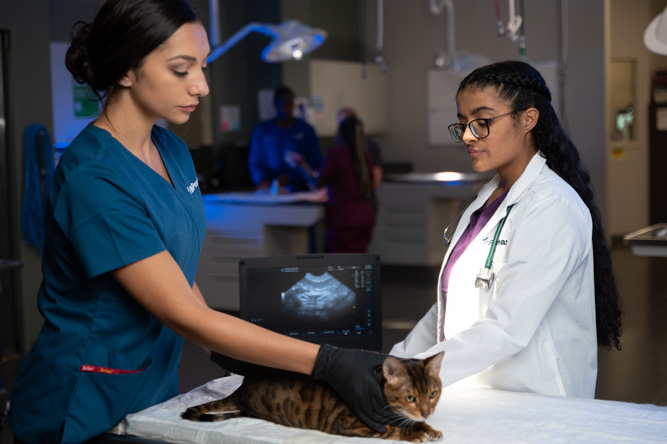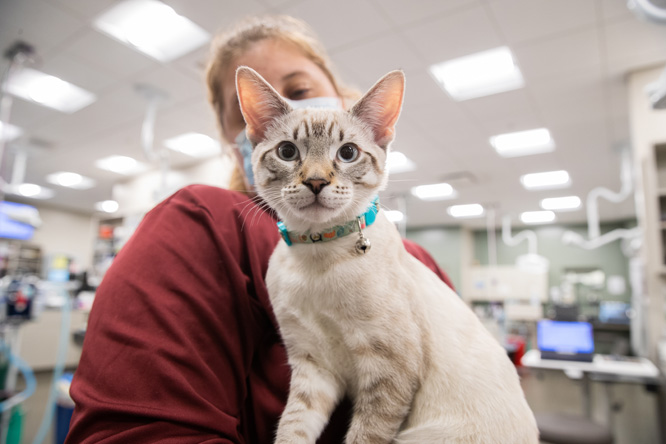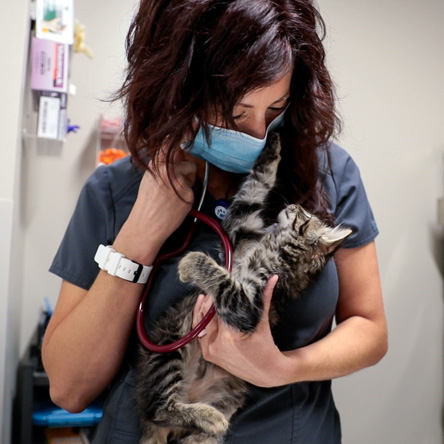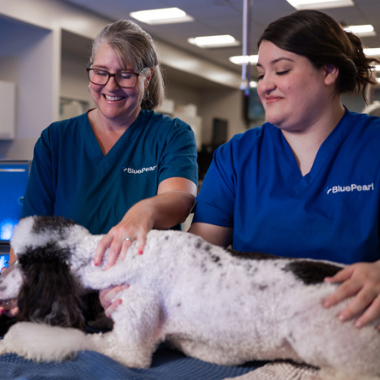Pet critical care by BluePearl.
Pet emergencies can be scary – we’re here to help you handle them.
We understand that seeing your pet sick, hurt or in distress can be stressful – especially if you don’t know what’s wrong. Fortunately, our experienced critical care clinicians are prepared to take action to provide lifesaving care

Conditions we treat.
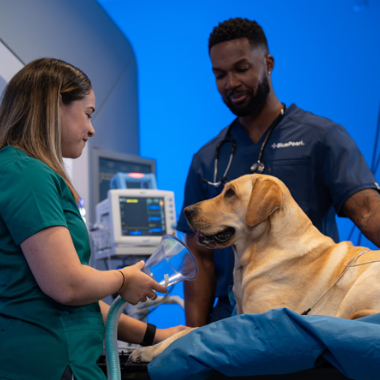
If your pet is experiencing a critical condition, you’ll have an entire veterinary team helping them so you can get back to what matters most – spending precious moments together.
Common cases that we see in the ICU include:
- Post-surgery recovery
- Trauma
- Sepsis
- Respiratory distress
- Pneumonia
- Shock
Services we offer.
Your pet will receive unparalleled medical care during their time at the hospital (and they’ll be spoiled with love and attention, too).
Advanced diagnostics
Your pet can’t tell us what’s wrong, so we use sophisticated diagnostics and imaging tools to uncover the source of the problem.
- Blood/urine testing
- Electrocardiography (ECG)
- Endoscopy
- Ultrasound
- Radiography (x-rays)
Treatment plans
Just as no two patients are the same, neither are their treatment plans. Our critical care team has experience with a range of advanced procedures and minimally invasive care options to get your pet on the path to wellness, including:
- Blood transfusions
- Electrolyte replenishment
- Oxygen therapy
- Breathing support
- Catheterization
- Nutritional support
- IV fluid therapy
Our board certified specialists and critical care team.
Experience makes all the difference.
Our critical care team is made up of veterinarians, vet technicians and assistants, and support staff with rigorous training and experience in specialty medicine. The team works hand in hand to provide the comprehensive, compassionate care your pet needs and deserves. Because we’re a multidisciplinary hospital, the team can consult the expertise of other specialty departments, too.
Tara Assenmacher
DVM, DACVECCDr. Tara Assenmacher is particularly interested in acute kidney disease and hemodialysis, hematologic emergencies, and sepsis.
- Diplomate, American College of Veterinary Emergency & Critical Care
- Residency, Emergency & Critical Care, Michigan State University, East Lansing
- Internship, Small Animal Medicine & Surgery, The Ohio State University, Columbus
- Doctor of Veterinary Medicine, Michigan State University, East Lansing
- Bachelor of Arts, Political Science, Kalamazoo College, MI
Dr. Assenmacher enjoys hiking, traveling, horseback riding and gardening. She and her husband, a BluePearl emergency clinician, have a number of pets: dogs Ozzie and Montgomery; cats Meow Meow, Denali and Alyeska; and horse Teddy.
Ashley Davis
DVM, DACVECCDr. Ashley Davis came to BluePearl after working as a veterinary criticalist at a busy referral center in Southwest Florida. She enjoys many aspects of critical care medicine including anesthetic emergencies, acute kidney disease, coagulation disorders and respiratory emergencies.
- Diplomate, American College of Veterinary Emergency & Critical Care
- Residency, Emergency & Critical Care, Angell Animal Medical Center, Boston MA
- Internship, Small Animal Medicine & Surgery, Angell Animal Medical Center, Boston MA
- Doctor of Veterinary Medicine, Virginia-Maryland Regional College of Veterinary Medicine, Blacksburg VA
- Bachelor of Science, University of Maryland, Baltimore
Dr. Davis enjoys hiking, cooking, running and spending time with her friends and family. She has two dogs, Abby and Brady, and chickens.
Melissa Santonocito
DVMDr. Melissa Santonocito is passionate about all aspects of critical care but is particularly interested in acute kidney injuries, sepsis and cardiac emergencies.
- Residency, Emergency & Critical Care, Michigan State University, East Lansing
- Internship, Small Animal Medicine & Surgery, BluePearl Pet Hospital, Southfield, MI
- Doctor of Veterinary Medicine, Michigan State University, East Lansing
- Bachelor of Science, Biology, Rochester Institute of Technology, NY
Dr. Santonocito loves spending time with her family and is an avid reader. She currently has two dogs (a Chihuahua named Zuni and a black Labrador retriever named Gertie) and two cats (Leroy and Samuel Hamilton, who is named after a character in her favorite book).
Brian Young
VMD, DACVIM, DACVECCDr. Brian Young was previously an adjunct professor at Western University. His clinical interests include shock recognition and resuscitation as well as transfusion medicine. He particularly enjoys ventilator medicine and finds septic shock cases a significant challenge that can be very rewarding to treat. Highly committed to developing the next generation of specialists, Dr. Young has evaluated residency programs and training guidelines as a member of the Residency Training Committee for the American College of Veterinary Emergency & Critical Care and is currently a board validator for the college. He is also a peer reviewer for articles submitted for publication in the Journal of Veterinary Emergency & Critical Care.
- Diplomate, American College of Veterinary Emergency & Critical Care
- Diplomate, American College of Veterinary Internal Medicine
- Dual Residency, Emergency & Critical Care and Internal Medicine, Animal Medical Center, New York City
- Internship, Small Animal Medicine & Surgery, Animal Medical Center, New York City
- Doctor of Veterinary Medicine, University of Pennsylvania, Philadelphia
- Bachelor of Science, Biology, University of Michigan, Ann Arbor
Dr. Young is an avid gardener and artist. He paints with oils, acrylics and encaustics, which are pigments melted in a beeswax-based medium. He loves horseback riding, hiking, attending the theater and dancing. His pets include West Highland white terrier Trip, cat Kentucky Blue, and thoroughbred Susie.
What to expect.
We want you to be prepared for your pet’s visit to the ICU, so you have one less thing to worry about. Our entire BluePearl team will be with you every step of the way.
How the ICU works
First, your pet will be triaged and cared for by our emergency medicine team. If they require hospitalization, your pet will be seamlessly transferred to the ICU, where our critical care team will stabilize and monitor them around the clock.
We know how difficult it is to be separated from your pet during this critical time, so we’ll keep you updated on their condition and continue to discuss testing and treatment options with you. Once your pet is stable, you’ll be able to give them more love and attention during visiting hours.
Our team will continue to partner with your primary veterinarian as part of the ongoing management of your pet’s care.
You know your pet better than anyone, and you play a crucial role in any follow-up treatment necessary. If you have any concerns about providing care at home after being discharged from the hospital (such as giving medication or monitoring your pet’s symptoms), let us know – we’re here for you.
